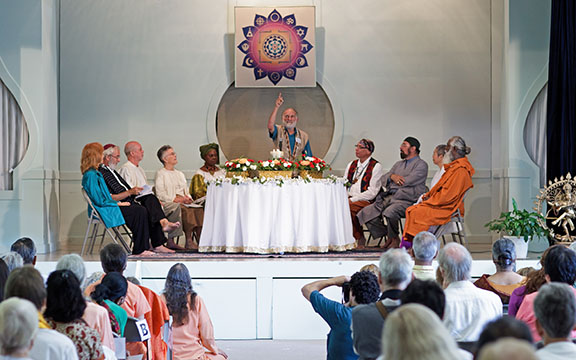
Photo: Interfaith service during a Yoga retreat at Satchidananda Ashram–Yogaville.
The idea of Cosmic Consciousness is spoken of in both scriptures and in scientific journals. If we only quote the scriptures some may not accept this idea of a universal, all-pervading Consciousness. If we quote a scientist, all are ready to accept it! Modern science has found and shown that there is Consciousness, even within an atom. Without Consciousness, the atom could not function; the electron would not be running around the neutron. That is why we say that God is Omnipresent—God is present as Consciousness everywhere and in everything.
Our understanding of God as Cosmic Consciousness is limited and so we limit the unlimited God by thinking that God has only one particular form. It’s just like what happens when you melt chocolate. First, it has no solid form or name. But when you pour it into molds, you give the chocolate different names. All the forms are the same chocolate. When children go to a candy store, one child will like the square chocolate, another may like the round chocolate, and a third one will like chocolate in the shape of a kitten.
The child that buys the square chocolate licks it and says, “My chocolate is very good.” The child that bought the round chocolate says, “That’s nonsense. No. Yours is not good. Mine is much better.” The child with the kitten-shaped chocolate might even say, “Only kitten-shaped chocolate will be accepted here!” Each child will create a “philosophy” of why their form of chocolate is the best. Then they will fight with one another in the name of chocolate! That means that none of them have understood the one essential substance of chocolate. If they understood the basic substance they would not fight. But because they forgot the essential stuff, they only see the different forms. When you come across people who fight in the name of religion and say, “Oh, my religion is the only good one and not that one,” know they are behaving as children.
But in our ten-day Yoga and interfaith retreats, we invited more than thirty-five religious sects from various denominations. They were all together for ten days caring and sharing with each other. On the final day of the retreat we had an interfaith service. A representative of each faith is seated around a table. In the middle of the table is a large candle that represents the one God. A Jewish Rabbi, a Benedictine monk, a Muslim Imam, a Jesuit priest, a Japanese Roshi, a Hindu monk, and others are all sitting around the table. One by one, each representative offers prayers to the One Light, in their own traditional way. That shows that people are beginning to understand the true Spirit of any one faith and that they want to come together. I often tell people we need to enjoy and appreciate the unity in the diversity. That is the reason why Yoga is spreading all over the world. Yoga teaches us to develop the same fundamental virtues that are found in almost every religion.
Another yogic teaching is that every individual is a representation of God, or is created in the image of God. Somehow, by living a self-centered life, we have lost sight of our True Nature. But once we begin to lead a dedicated life, a selfless life, our minds become calm and our thoughts become pure, thus we are able to realize the true divinity within each and every one of us. We see this message in almost every faith. Not one faith asks us to be selfish. The terminology used may differ, but the principle is the same: renounce selfishness.
The idea of offering oneself to God is in almost every religion. What is being offered or sacrificed is our personal desire, the expectation of some personal reward from whatever we say or do. That is what must be let go of. When we think of only “I, me, mine, we are thinking in terms of separateness from God and from one another. The phrase “Love thy neighbor as thyself” means that everything belongs to God and we want to offer it back to God. All the spiritual practices exist to help us. The practices themselves will differ but the purpose of any spiritual practice is the same—to realize our inner peace and joy.
One of our yogic practices consists of physical postures. But that is a very small part of Yoga. People can be yogis even without those physical postures. Still, if it is possible for you to do even one or two, we recommend that because it helps to keep the body and mind in good health. We cannot experience our true, divine nature without keeping our bodies and our minds clean and calm. In the Bible it is written, “Blessed are the pure in heart; they shall see God.” Pure in heart means, a calm mind. The Bible didn’t say, “Blessed are those who print a million Bibles and distribute them for free.” Or, “Blessed are people who build a number of churches; they shall see God.” Any businessperson could do that. The important requirement to recognize your essential nature, your divine nature, is pure thought. Purity of thought or purity of mind is always connected with living a peaceful and balanced life, without excesses or extremes which affect the mind in a negative way.

Photo: Hatha Yoga outdoors in Yogaville.
So, we do recommend some Hatha Yoga to take care of the body. And again, the physical postures alone will not make your body healthy and clean. One should also take care of what goes into the body. Realize what makes you unwell. It is all the undesirable foods and drinks that you put into your body that can create illnesses. Yoga teaches you to cultivate very basic good habits.
You may sit in meditation for hours and hours, but if you don’t take care of your body, your food cannot be well-digested. It is not only food that goes into the body but liquids, air, sights and sounds go into the body through the sense organs. What you see goes in through the eyes and what you hear goes through the ears. Even thoughts can be said to “enter” into the mind. So one should be very, very careful about what goes into the body and mind through the senses.
Some common habits that are unhelpful, can be easily corrected through Yoga practice. You might think that having some wine is the best way to relax. And when you take a puff of marijuana or even nicotine, you think you will feel calm. There’s no way that drugs or alcohol will result in true relaxation. So one has to be very, very careful.
Another important point is that non-vegetarian food and compassion can never go together. Even medical science has shown that most of our physical ailments are caused by eating meat. One reason is because the meat is more susceptible to viruses than plant food and it and takes a longer time for the meat to be digested. Once an animal is killed, immediately its flesh becomes dead matter; it begins to decay. That is why when all that decayed food goes in it becomes toxins in your system and comes out as foul matter. That is the reason why most of the meat-eating people have to use lots of deodorant!
When there are plenty of vegetables, beans, rice and so on, you don’t need to eat animals for nutrition. Statistics show that to produce one pound of meat, the animal has to be fed fifty pounds of grain. That means, when a person eats one pound of meat, they are indirectly eating fifty pounds of grain. If you just eat the grain directly, there will also be enough food for at least ten other people. This all makes sense from an economical and environmental standpoint. When we all become vegetarian there will be more food for more people. We will have plenty to eat if everyone eats the natural way.
So you can see, that many problems in this world could be solved through a yogic lifestyle. Having plenty of food to feed the world, good health for all people, and a life of harmony and happiness for all is possible.

